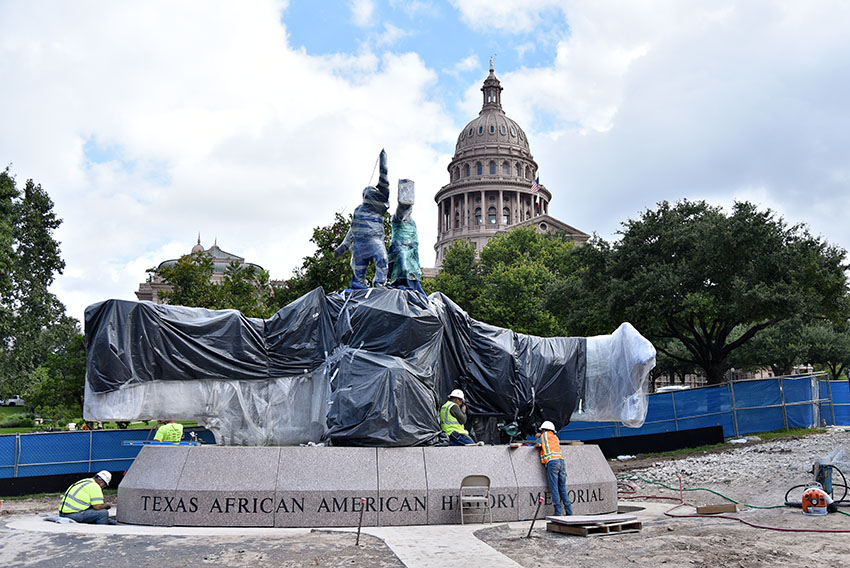As Texans, we are no longer shocked by the absurdity that constantly escapes from the State Capitol. Between the often pernicious bills passed in the Lege and the seemingly large population of ignorant and out-of-touch lawmakers that inhabit it, it is often hard to have faith in our state government.
Despite this overall disdain, we must give credit where credit is due. On Sept. 27, crews started assembling the Texas African-American History Memorial on the lawn of the Capitol, which is set to be completed by the end of the fall. The statue represents the history of African-Americans in Texas and their contributions to the state, with a specific section dedicated to emancipation in the state. This achievement is the result of a fight extending back over 20 years, and is well overdue. We cannot ignore our darkness: distance from our terrible history can only happen through active acknowledgment of it, not through ignoring or downplaying it.
While it would appear Texas lawmakers are finally starting to understand the importance of such measures, we know not to get too excited. What’s the catch?
The statue will appear on the lawn of a building severely decorated with pro-Confederate imagery. When placed on the same grounds as a plaque located in the Capitol building that calls Confederate war veterans “patriotic” and denies slavery was a cause for the Civil War to the statues of Confederate soldiers on the lawn, the ode to Texas’ African-Americans appears insincere and a step simply made for the sake of appeasement. The lawmakers who fought for this statue for over two decadesfinally achieved their goal of some sort of representation. But sadly, the statue will still be largely overshadowed by inherently racist imagery that celebrates, rather than condemns, those who fought on the side of tyranny.
We understand any Texans have distant relatives who fought on the side of the Confederacy and want to actively defend their service out of a purely emotional appeal. But despite our ties, it is not worthy of celebration.
And that’s OK. A person is not defined by the actions of their ancestors. What matters is how they choose to react given the facts. But nearly 150 years later, it is time to recognize that our ancestors had faults not worthy of celebration. We cannot continue to celebrate bigotry and try to downplay it by placing an inclusive statue within a few feet.
And defending these statues as pieces of history also misses the larger purpose behind their placement. Many of these monuments were built as a way to make clear statements during times of racial tension. Following Plessy v. Ferguson and during the Civil Rights era, these monuments cropped up across the South — including the placement of the Children of the Confederacy Creed plaque inside the capitol building in 1959, and the naming of a state office building for Confederacy Postmaster General John H. Reagan in 1962.
But while the statues are undoubtedly problematic — they stand to memorialize those who fought to keep slavery legal — they’re less problematic than that plaque, which abandons the facade of memorializing a particular brave ancestor for their service in order to further the carefully crafted lie that is the “states’ rights” explanation for the Civil War.
For all the cries of revisionism that Confederate apologists make whenever a statue is removed or a building renamed, this understanding is the literal definition of rewriting history. The Texas Ordinance of Secession outlines why African slaves “were rightfully held and regarded as an inferior and dependent race, and in that condition only could their existence in this country be rendered beneficial or tolerable.” The only rights it discusses are what they perceive to be the right of white men to own slaves.
We’d prefer that the statues that memorialize those who fought for this cause be taken down, but we also know that’s almost guaranteed not to happen. For now, we simply ask that the state acknowledge that what they fought for was wrong, and remove a plaque that fights hard to heroize those who deserve the opposite.
The African-Americans who have fought for over 150 years to be recognized as equals are those who deserve to be heroized. We congratulate all those who have fought to make this a possibility, especially State Sen. Rodney Ellis, who has for years spearheaded the effort to have this statue built. But it is never enough to be complacent with a small victory in the face of overwhelming injustice. And that’s what this is.





















